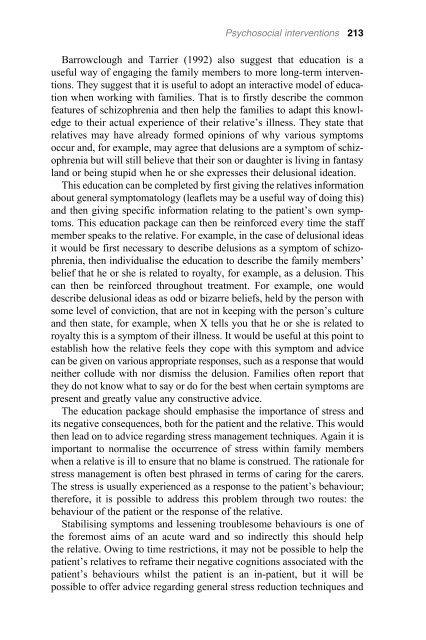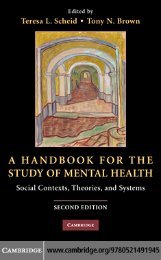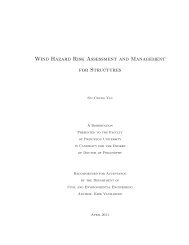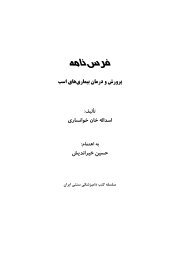Mental Health Nursing
Mental Health Nursing
Mental Health Nursing
You also want an ePaper? Increase the reach of your titles
YUMPU automatically turns print PDFs into web optimized ePapers that Google loves.
Psychosocial interventions 213<br />
Barrowclough and Tarrier (1992) also suggest that education is a<br />
useful way of engaging the family members to more long-term interventions.<br />
They suggest that it is useful to adopt an interactive model of education<br />
when working with families. That is to firstly describe the common<br />
features of schizophrenia and then help the families to adapt this knowledge<br />
to their actual experience of their relative’s illness. They state that<br />
relatives may have already formed opinions of why various symptoms<br />
occur and, for example, may agree that delusions are a symptom of schizophrenia<br />
but will still believe that their son or daughter is living in fantasy<br />
land or being stupid when he or she expresses their delusional ideation.<br />
This education can be completed by first giving the relatives information<br />
about general symptomatology (leaflets may be a useful way of doing this)<br />
and then giving specific information relating to the patient’s own symptoms.<br />
This education package can then be reinforced every time the staff<br />
member speaks to the relative. For example, in the case of delusional ideas<br />
it would be first necessary to describe delusions as a symptom of schizophrenia,<br />
then individualise the education to describe the family members’<br />
belief that he or she is related to royalty, for example, as a delusion. This<br />
can then be reinforced throughout treatment. For example, one would<br />
describe delusional ideas as odd or bizarre beliefs, held by the person with<br />
some level of conviction, that are not in keeping with the person’s culture<br />
and then state, for example, when X tells you that he or she is related to<br />
royalty this is a symptom of their illness. It would be useful at this point to<br />
establish how the relative feels they cope with this symptom and advice<br />
can be given on various appropriate responses, such as a response that would<br />
neither collude with nor dismiss the delusion. Families often report that<br />
they do not know what to say or do for the best when certain symptoms are<br />
present and greatly value any constructive advice.<br />
The education package should emphasise the importance of stress and<br />
its negative consequences, both for the patient and the relative. This would<br />
then lead on to advice regarding stress management techniques. Again it is<br />
important to normalise the occurrence of stress within family members<br />
when a relative is ill to ensure that no blame is construed. The rationale for<br />
stress management is often best phrased in terms of caring for the carers.<br />
The stress is usually experienced as a response to the patient’s behaviour;<br />
therefore, it is possible to address this problem through two routes: the<br />
behaviour of the patient or the response of the relative.<br />
Stabilising symptoms and lessening troublesome behaviours is one of<br />
the foremost aims of an acute ward and so indirectly this should help<br />
the relative. Owing to time restrictions, it may not be possible to help the<br />
patient’s relatives to reframe their negative cognitions associated with the<br />
patient’s behaviours whilst the patient is an in-patient, but it will be<br />
possible to offer advice regarding general stress reduction techniques and
















